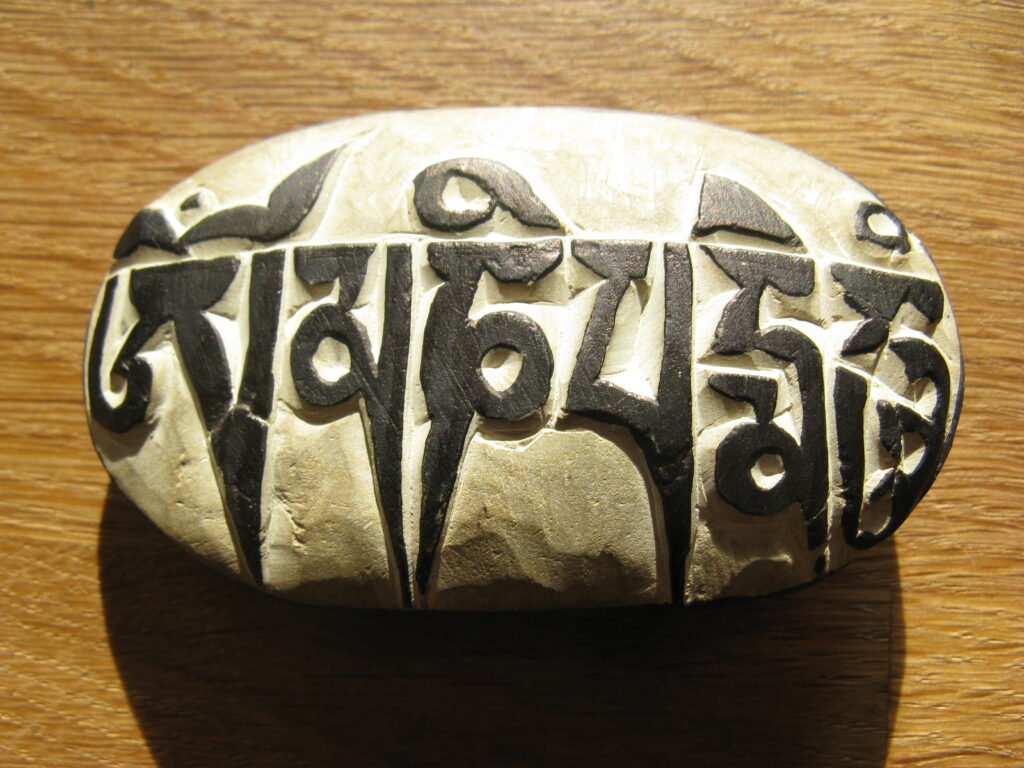
Mantras for Men: Unleashing the Power of Positive Affirmations
In today’s world, where stress and negativity often dominate our daily lives, it’s crucial for men to find effective ways to maintain their mental health and overall well-being. One powerful tool that has gained significant attention in recent years is the use of mantras or positive affirmations. This article will explore the concept of mantras for men, their benefits, and how to incorporate them into your daily routine for a more fulfilling and successful life.
NB : If you want to try a mantra based meditation, you can try the Metta Meditation ( Metta bhavana ) which is a loving kindness meditation or the Transcendental meditation ( T.M ) which is a mantra meditation with traditional Vedic mantras .
Understanding Mantras and Positive Affirmations
Mantras, originating from ancient spiritual practices, are words or phrases repeated to aid concentration in meditation. In modern usage, mantras have evolved into positive affirmations – short, powerful statements that, when repeated regularly, can help reshape our subconscious mind and influence our thoughts, behaviors, and overall outlook on life.
Positive affirmations are based on the principle that our thoughts and beliefs shape our reality. By consciously choosing and repeating positive statements, we can gradually replace negative thought patterns with more constructive ones, leading to positive change in various areas of our lives.

The Science Behind Positive Affirmations
The effectiveness of positive affirmations is not just anecdotal; it’s backed by scientific research. According to self-affirmation theory, developed by psychologist Claude Steele in the 1980s, affirming one’s values can help maintain a positive self-image and reduce defensive responses to threats to one’s self-concept.
A study published in the journal Social Cognitive and Affective Neuroscience found that self-affirmation activates brain circuits associated with self-related processing and reward. This suggests that positive affirmations can indeed have a tangible impact on our neural pathways and, consequently, our thoughts and behaviors.

Benefits of Mantras for Men
Incorporating mantras or positive affirmations into your daily life can yield numerous benefits:
- Improved Mental Health: Regular practice of positive affirmations can help combat negative self-talk, reduce stress levels, and boost self-esteem. This is particularly important for men who may struggle with expressing emotions or seeking help for mental health issues.
- Enhanced Self-Confidence: By consistently affirming your worth and capabilities, you can develop a stronger sense of self and become more confident in social situations and when facing new challenges.
- Increased Motivation: Positive affirmations can help you stay focused on your goals and maintain motivation, even during tough times or when facing obstacles.
- Better Stress Management: Mantras can serve as a calming influence, helping you maintain inner peace and manage stress more effectively in your daily life.
- Improved Physical Health: The mind-body connection is well-established, and reducing negative thoughts through affirmations can have a positive impact on your physical health as well.
- Enhanced Decision-Making Abilities: By fostering a positive mindset, affirmations can help you approach problems with clarity and make better decisions.
- Increased Resilience: Regular practice of affirmations can build inner strength, making you more resilient in the face of adversity and better equipped to handle difficult situations.

READ MORE: Self-Care Ideas to Fight Againts Depressions
Crafting Effective Mantras for Men
While there are many examples of positive affirmations available, creating your own can be a powerful and personal experience.
Here are some tips for crafting effective mantras:
- Use Present Tense: Frame your affirmations as if they’re already true. For example, “I am confident and capable” rather than “I will be confident and capable.”
- Keep it Positive: Focus on what you want, not what you don’t want. Instead of “I don’t want to be anxious,” try “I am calm and in control.”
- Make it Personal: Use “I” statements to make the affirmation more personal and powerful.
- Be Specific: The more specific your affirmation, the more effectively it can guide your thoughts and actions.
- Keep it Realistic: While affirmations should be positive, they should also be believable. Gradual, achievable goals are more effective than grandiose statements.
- Include Emotion: Incorporate feelings into your affirmations to make them more impactful. For example, “I feel confident and energized in social situations.”

Powerful Mantras for Men
Here are some examples of powerful daily affirmations tailored for men:
- “I am worthy of love and respect.”
- “I am confident in my abilities and decisions.”
- “I embrace new challenges as opportunities for growth.”
- “I am in control of my thoughts and actions.”
- “I am constantly evolving into the best version of myself.”
- “I attract success and abundance in all areas of my life.”
- “I am a strong and capable leader.”
- “I face difficulties with courage and resilience.”
- “I am deserving of success and happiness.”
- “I trust in my journey and embrace the present moment.”

Incorporating Mantras into Your Daily Routine
To harness the full power of positive affirmations, it’s essential to make them a regular part of your daily life. Here are some effective ways to incorporate mantras into your routine:
- Morning Ritual: Start your day by repeating your chosen affirmations. This sets a positive tone for the day ahead.
- Mirror Work: Stand in front of a mirror and say your affirmations out loud while making eye contact with yourself. This can feel uncomfortable at first but can be a powerful practice.
- Meditation: Incorporate your mantras into your meditation practice, using them as a focus point for your thoughts.
- Written Practice: Write down your affirmations in a journal each day. The act of writing can help reinforce the message in your mind.

- Visual Reminders: Place sticky notes with your affirmations in places you’ll see them often, like your bathroom mirror, computer screen, or car dashboard.
- Before Bed: End your day by repeating your affirmations. This can help program your subconscious mind as you sleep.
- During Exercise: Repeat your mantras while working out to boost your motivation and endurance.
- In Stressful Situations: Use your affirmations as a tool to center yourself when facing challenging or stressful situations.

Overcoming Challenges in Practicing Affirmations
While the concept of using mantras or positive affirmations is simple, putting it into practice can sometimes be challenging. Here are some common obstacles and how to overcome them:
- Feeling Inauthentic: If affirmations feel forced or fake, start with more neutral statements and gradually work towards more positive ones as your belief system shifts.
- Lack of Consistency: Like any habit, consistency is key. Set reminders or link your affirmation practice to existing habits to ensure regular practice.
- Impatience: Remember that change takes time. Be patient and persistent in your practice, and you will start to see results.
- Negative Self-Talk: When negative thoughts arise, acknowledge them without judgment, then consciously replace them with your positive affirmations.
- Lack of Belief: If you struggle to believe your affirmations, try adding phrases like “I am learning to…” or “I am in the process of…” to make them feel more achievable.

Mantras for Specific Goals
While general affirmations are beneficial, you can also create mantras tailored to specific goals or areas of your life:
For Career Success:
“I am a valuable asset to my team and organization.”
“I attract new opportunities for growth and advancement.”
“I am confident in my skills and abilities in the workplace.”
For Relationships:
“I am worthy of healthy and fulfilling relationships.”
“I communicate openly and honestly with my partner.”
“I attract positive and supportive people into my life.”
For Physical Health:
“I nourish my body with healthy food and regular exercise.”
“I am strong, healthy, and full of energy.”
“I listen to my body and give it what it needs to thrive.”
For Financial Abundance:
“I am worthy of financial success and abundance.”
“Money flows to me easily and effortlessly.”
“I make wise financial decisions that support my goals.”
For Personal Growth:
“I embrace change and see it as an opportunity for growth.”
“I am constantly learning and expanding my knowledge.”
“I step out of my comfort zone and welcome new experiences.”

The Role of Mantras in Alpha Male Mindset
The concept of the “alpha male” has evolved over time, moving away from outdated notions of dominance and aggression towards a more balanced view of confident, self-assured masculinity.
Mantras can play a crucial role in developing and maintaining this positive alpha male mindset:
- Self-Confidence: Affirmations like “I am confident in my abilities and decisions” can help reinforce a strong sense of self.
- Leadership: Mantras such as “I am a natural leader who inspires others” can help cultivate leadership qualities.
- Emotional Intelligence: Affirmations like “I am in tune with my emotions and those of others” can promote emotional awareness and empathy.
- Resilience: Mantras like “I face challenges with courage and determination” can build mental toughness.
- Authenticity: Affirmations such as “I am true to myself and my values” can help maintain a genuine sense of self.

Mantras for Men From Miscellaneous Ethnicity
While mantras and affirmations are beneficial for all men, black men may face unique challenges that can be addressed through specific affirmations:
- “I am proud of my heritage and the strength it gives me.”
- “My experiences and perspective are valuable and worthy of being heard.”
- “I define my own success and am not limited by societal expectations.”
- “I am resilient in the face of adversity and prejudice.”
- “My presence and contributions enrich every space I enter.”
These affirmations can help combat negative stereotypes, boost self-esteem, and reinforce a positive self-image in the face of systemic challenges.

The Impact of Mantras on Personal Relationships
Positive affirmations can have a significant impact on your personal relationships. By fostering self-love and confidence, you become better equipped to form and maintain healthy connections with others. Some ways mantras can improve your relationships include:
- Improved Communication: Affirmations like “I express myself clearly and listen actively” can enhance your communication skills.
- Increased Empathy: Mantras focused on understanding others can help you become more empathetic and compassionate.
- Boundary Setting: Affirmations about self-worth can help you establish and maintain healthy boundaries in relationships.
- Conflict Resolution: Positive self-talk can help you approach conflicts with a calm and solution-oriented mindset.
- Attracting Healthy Relationships: By affirming your worth and what you deserve, you’re more likely to attract and maintain positive relationships.

Mantras and Professional Success
In the competitive world of career and business, mantras can be a powerful tool for achieving professional success:
- Confidence in Meetings: Use affirmations like “I speak with confidence and my ideas are valuable” before important meetings or presentations.
- Networking: Mantras such as “I connect easily with others and build meaningful professional relationships” can help ease social anxiety in networking situations.
- Career Advancement: Affirmations like “I am worthy of success and advancement in my career” can help you pursue and achieve your professional goals.
- Entrepreneurship: For those running their own businesses, mantras like “I am a successful entrepreneur who makes wise business decisions” can boost confidence and decision-making abilities.
- Work-Life Balance: Use affirmations like “I maintain a healthy balance between my work and personal life” to prevent burnout and maintain overall well-being.

Overview of the History and Usage of Mantras
Mantras, sacred utterances believed to possess spiritual power, have played a significant role in various cultures and religions throughout history. This overview explores the origins, evolution, and contemporary applications of mantras, highlighting their enduring importance in spiritual practices and daily life.
Historical Origins
The concept of mantras can be traced back to ancient civilizations, with their earliest known origins found in the Vedic texts of ancient India, dating from around 1500 BCE to 500 BCE . The term “mantra” itself is derived from Sanskrit roots: “man,” meaning “to think,” and “tra,” meaning “instrument” or “tool,” thus translating to “instrument of thought”.

This etymology underscores the fundamental purpose of mantras as tools for focusing the mind and achieving spiritual insight. In the Vedic tradition, mantras were initially used in rituals and sacrifices to invoke deities and cosmic forces . The Vedic poets, fascinated by the power of sound and its ability to inspire and transform, developed mantras as a blend of art and science.
During this early period, mantras were meticulously chanted by Brahmin priests during rituals, with great emphasis placed on correct pronunciation and intonation to ensure their efficacy.Mantras written on a rock in Nepal, showcasing their enduring presence in spiritual practices.As the Vedic tradition evolved, so did the use of mantras.
By the middle Vedic period (1000 BCE to 500 BCE), mantras had become a central element of Hindu spiritual practice, used not only in rituals but also in meditation and personal spiritual development. This expansion of mantra usage coincided with the development of new deities and practices, leading to the creation of mantras dedicated to specific gods and goddesses.

Evolution Across Cultures and Religions
While the Vedic tradition is the most well-documented source of mantras, similar practices can be found in other ancient civilizations. For instance, the Avestan texts of ancient Iran contain references to mantras known as “mąθra,” suggesting a common Indo-Iranian origin for these practices dating back to around 2000 BCE.
Hinduism
In Hinduism, the use of mantras expanded beyond ritualistic contexts to include personal devotion and meditation. The rise of the Bhakti movement, which emphasized personal devotion to a deity, further popularized the use of mantras as a means of establishing a personal connection with the divine.
Hindu mantras often include the sacred syllable “Om,” considered the primordial sound and the essence of the universe. This syllable is frequently used in conjunction with “bija” (seed) syllables, which are believed to encapsulate the essence of a deity.

Buddhism
Buddhism, which emerged in the 5th century BCE, adopted and adapted the use of mantras from Hinduism. In Buddhism, mantras are particularly significant in the Mahayana and Vajrayana traditions, where they are used as tools for meditation and spiritual development.
The famous mantra “Om Mani Padme Hum,” associated with the bodhisattva Avalokiteshvara, is a central practice in Tibetan Buddhism and is believed to embody compassion. Buddhist mantras often serve as vehicles for achieving enlightenment and liberation from the cycle of rebirth (samsara).

Jainism
Jainism, which developed alongside Buddhism, also incorporates mantras into its spiritual practices. Jain mantras are used for meditation, purification, and the invocation of Tirthankaras (spiritual teachers). The Namokar Mantra, one of the most important Jain mantras, is recited to pay homage to these enlightened beings and seek their blessings.

Types of Mantras and Their Purposes
Mantras serve a wide range of purposes, from invoking divine energies to promoting healing and personal transformation. Some of the main types of mantras include:
- Bija Mantras (Seed Mantras): Single-syllable sounds believed to contain the essence of a particular energy or deity, used to invoke specific spiritual energies or focus the mind during meditation. Example: “Om”.
- Saguna Mantras (With Form): Associated with specific deities, used to invoke their qualities and blessings. Example: “Om Namah Shivaya” dedicated to Lord Shiva.
- Nirguna Mantras (Without Form): Focus on abstract concepts or the formless aspect of the divine, used to transcend the material world. Example: “So Hum” meaning “I am that”.
- Healing Mantras: Designed to promote physical, emotional, and spiritual healing. Example: The “Maha Mrityunjaya Mantra” for health and longevity.
- Transformative Mantras: Used for personal growth and transformation, helping to overcome obstacles and enhance self-confidence. Example: “Om Mani Padme Hum” in Buddhism.
- Protective Mantras: Chanted for protection against negative energies and psychic attacks. Example: The mantra “Ram” for warding off evil influences.
- Meditation Mantras: Used to focus the mind and deepen meditation practice. Example: Simple mantras like “Om” or “Peace”.

Cultural Significance and Modern Usage
The cultural significance of mantras extends beyond their religious origins, influencing spiritual practices, daily life, and even societal structures across different parts of the world. In African cultures, for instance, chanting and singing play integral roles in spiritual and daily life, with some traditions involving the selection of songs for unborn children.
In East Asian cultures, particularly in Pure Land Buddhism, the recitation of the name of Amitabha Buddha is believed to ensure rebirth in a heavenly paradise .In modern times, the use of mantras has transcended religious boundaries and entered the realms of personal growth and wellness.
Mantras are now commonly used in yoga and meditation practices worldwide to promote mental clarity, relaxation, and spiritual well-being. The global spread of these practices has led to a broader appreciation of mantras as tools for enhancing mindfulness and personal transformation.

Scientific Perspectives
Recent scientific studies have explored the effects of mantra chanting on mental and physical well-being. Research suggests that mantra meditation
The psychophysiological effects of mantra meditation are well-documented, with studies showing that the repetition of a mantra can elicit a relaxation response characterized by decreased heart rate, blood pressure, and stress hormone levels . Functional magnetic resonance imaging (fMRI) studies have also revealed that mantra meditation can lead to changes in brain connectivity, particularly in areas associated with stress and anxiety regulation.

Conclusion
Incorporating mantras and positive affirmations into your daily life can be a transformative practice for men seeking personal growth, improved mental health, and greater success in various aspects of life. By consistently reinforcing positive thoughts and beliefs, you can reshape your subconscious mind, boost your self-esteem, and approach life’s challenges with greater confidence and resilience.
Remember, the journey of personal development is ongoing, and the use of mantras is just one tool in your arsenal. Combine this practice with other healthy habits such as regular exercise, a balanced diet, adequate sleep, and meaningful social connections for the best results. As you embark on this journey of self-improvement through the power of positive affirmations, be patient with yourself and celebrate small victories along the way.
With time and consistent practice, you’ll find yourself becoming the best version of yourself – confident, resilient, and ready to tackle whatever challenges come your way.
Start today by choosing one or two affirmations that resonate with you and make them a part of your daily routine. As you experience the positive impact of this practice, you may find yourself naturally expanding your repertoire of mantras and integrating them more deeply into your life.
